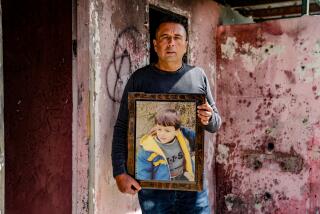‘In This Way I Was Saved’ by Brian DeLeeuw
- Share via
In This Way I Was Saved
A Novel
Brian DeLeeuw
Simon & Schuster: 296 pp., $25
On a New York City playground one cool November day, 6-year-old Luke Nightingale meets Daniel. After they spend the afternoon together battling invisible dinosaurs, Luke invites the boy home to play. “Later, I liked to remind him that he came looking for me first,” Daniel explains early in his stubborn, unsettling narration. “I didn’t ask for any of it.”
From the very first pages of “In This Way I Was Saved” -- Brian DeLeeuw’s assured, unnerving first novel -- the boundaries between what’s real and imagined shift and bleed together. The two boys are inseparable, and it’s clear from the outset that something about their friendship is not quite right. Daniel appears to have emerged out of nowhere, and Luke’s mother, Claire -- recently divorced and alarmingly volatile -- is oblivious to her son’s ever-present new friend. Daniel himself is precocious and conniving; he stirs up much of the action yet somehow remains outside of it. Strangeness builds and swells.
After Daniel overestimates his standing and pushes the other boy too far, Luke tries to break free. He manages to keep him at bay for 10 years, until one bleak night -- compelled by his mother’s deterioration and his own teenage despair -- Luke calls upon his old friend. This time, Daniel is determined to make his influence known. “I wanted him to recognize that without my help, without drawing me closer to him, he would only continue to humiliate himself,” Daniel claims, with characteristic arrogance.
Although he’s a constant presence, and couldn’t be more real or threatening to Luke, Daniel doesn’t exist in a form anyone but Luke can see. Still, because the story is told from Daniel’s toxic, misanthropic point of view, he seems more vital than his pale, fumbling counterpart.
Daniel’s condition is intimately tied to Luke’s state of mind, and especially to his weaknesses. His appearance is dictated by the whims of his host, his face taking on “the shape of Luke’s loneliness.” If Luke summons the will to subdue him, Daniel might look down and see himself wearing a straitjacket. To avoid this, Daniel works hard to gain Luke’s trust, while undermining him at every turn.
Though it’s tempting to see him as a product of Luke’s childhood distress, Daniel cannot be easily explained as a split personality or imaginary friend; psychosis and trauma account for part of his being, but the story unfolds around a grain of something even more sinister and elusive. DeLeeuw’s fine, taut prose conjures vivid images that hint at danger: Learning to read, a young Luke finds a tricky word “curled in on itself like a worm poked by a stick.” A bully has “a face like a closed fist.” An upended carton of Chinese food provides “a greasy geometry lesson.” A boy’s tequila-tainted breath smells like “gasoline and baking pavement.”
DeLeeuw ably pulls off what seems at first to be a questionable conceit, with echoes of the destructive, delusional protagonists of Chuck Palahniuk’s “Fight Club,” and that book’s attendant questions about masculinity and self-deception. He draws us into a world where psychological warfare is a way of life, and his characters’ understandings of who they are develop into a gripping mystery. Suspense and anxiety drive the narrative -- DeLeeuw is clearly fascinated by the workings of the human mind, using his characters to explore how perceptions can provoke us, and to wonder about the extent to which we’re truly responsible for our own actions.
Luke’s vulnerability is what makes Daniel possible, and Daniel preys on it. He depends on Luke -- is obsessed with him -- but he’s also confined by him. Ultimately, he despises him. And so the two boys are defined by their extremes: Luke is basically good, while Daniel is the fiend hunkered down on his shoulder, whispering taunts. Luke is devoted to his damaged mother; Daniel is repulsed by her. Daniel hungers for sex, while Luke is cautious around girls. It’s unclear which boy is more “real,” but Daniel’s feelings have more urgency and a stronger pulse. So, is Luke just a victim, a fragile shell that will eventually fall away? And who is to blame for Daniel’s crimes?
Midway through the book, DeLeeuw offers a labored glimpse into Luke’s dark family legacy, and later, he introduces something of a whodunit subplot. Both feel like needless distractions from the tense, doomed drama between the protagonists. As the book chills to a close, revelations add layers of calculated cleverness to what is, at its heart, a straightforward story about an elemental conflict. When DeLeeuw focuses on these two fractured parts of one whole, his portrait of dangerous minds is at its most haunting and persuasive.
Loeb is a writer in New York City.
More to Read
The biggest entertainment stories
Get our big stories about Hollywood, film, television, music, arts, culture and more right in your inbox as soon as they publish.
You may occasionally receive promotional content from the Los Angeles Times.










